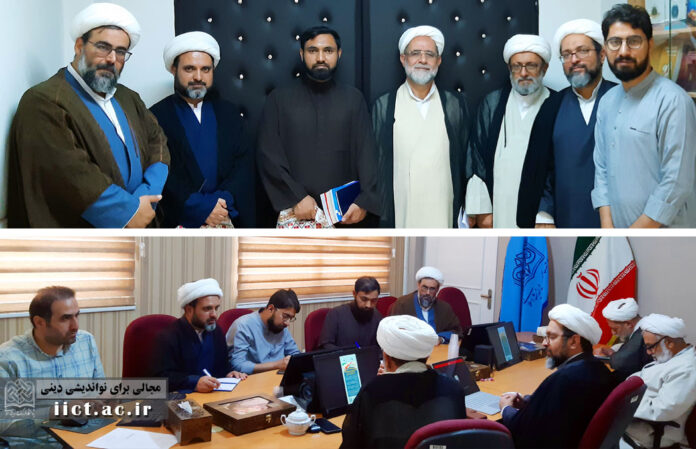According to the Public Relations Office of IICT, on Wednesday, July 3, 2024, a group of Shia scholars and students from Pakistan visited the Institute’s Qom office. During their visit, they attended a meeting with the directors and faculty members of the Department of Islamic Theology and New Theology at the Institute.
Hojjat al-Islam Mohammad Baqer Pouramini, the head of the department, along with faculty members Mohammad Hassan Ghadrdan Gharamaleki, Mohammad Safar Jebreili, and Mohammad Kashizadeh, and also Mohammad Mahdi Najafi, the head of the Institute’s Office of the Presidency, were present at the meeting.
A report on the history and activities of the Institute, the capabilities, and areas of specialization of the faculty members was presented by the head of the Office of the Presidency. The head of the Department of Islamic Theology and New Theology also presented the programs and scientific publications produced by the department.
Following this, a discussion was held on the theological trends in the Islamic world and the most important theological issues of the modern world, with speeches delivered by the participants.
In this discussion, Hojjat al-Islam Mohammad Baqer Pouramini, head of the Department of Islamic Kalam and New Theology, stated: “One of the important actions that Shia intellectuals in the Islamic world can focus on is the emphasis on the rationality of the Shia school of thought. This advantage has two characteristics.”
He continued, “Firstly, it can address external doubts, particularly in the areas of philosophical atheism and science-based skepticism, areas in which many literalist movements, especially the Salafis, are lacking and unfortunately have no answers for their educated and young followers. It should be acknowledged that in the past, when Marxist ideas were emerging, it was only the great Shia thinkers and figures who, relying on rational and argumentative sources, could respond to many of these doubts. Martyr Ayatollah Morteza Motahhari was a defender and promoter of Islamic rationality and confronted the historical reactionaries. He clearly identified the dangers of these movements and warned about their consequences.”
Pouramini added, “Secondly, by focusing on reason, we can confront deviant intra-religious movements. One way to critique the Salafi movements, particularly Wahhabism and certain Deobandi sects, is to challenge them on the issue of rational evidence. They only believe in basic and innate reason and deny rational argumentation. As a result, due to their reliance on the literal interpretation of texts, they present a distorted understanding of religion.”
He concluded by emphasizing that the exponents of the Shia school, by utilizing the shared implicit capacities within the Ash’ari and Maturidi schools, can collaborate to critique deviant movements. Instead of taking a defensive stance, they should take the initiative, challenge the opponent, and force them to respond. The concept of monotheism promoted by some Salafi movements is essentially based on polytheism, even though they present themselves as monotheists. In addition to their polytheistic claims, the Salafis, due to their extreme literalism, promote a form of anthropomorphic and corporeal monotheism. Their beliefs and practices are alien to the early generations of Islam (the first three centuries), and due to their numerous contradictions with the Companions and Followers, they cannot truly be called Salafis.”
At the end of the session, the Pakistani students and scholars raised their questions and concerns.




